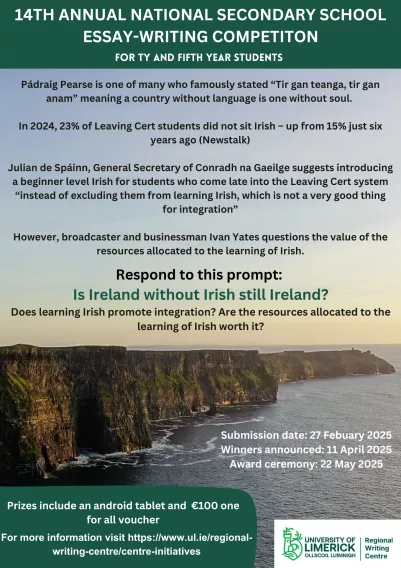Top Three Finalists
The judges have chosen their top three finalists for the 14th Annual National Secondary School Essay-Writing Competition. The three finalists will attend the awards ceremony on the 22nd of May, where the winner of the android tablet and two runners-up will be announced.
The top three finalists are as follows, in no particular order.
- Emily Walsh, 5th Year student from Loreto Secondary School, Tipperary.
- Swasti Sahoo, TY student from Adamstown Community College, Dublin.
- Anna Nic Mhánais, 5th Year student from Coláiste Íde, Co.Chiarraí.
University of Limerick Regional Writing Centre announces its fourteenth annual National Secondary School Essay-writing Competition for Transition and 5th-year students.
The primary purpose of our competition is to give students the opportunity to write persuasively on social issues that are relevant to them in preparation for the argumentative writing they will perform later at third level. In addition, the competition highlights the Regional Writing Centre’s commitment to a life-long learning approach to writing, helping students to develop strategies to become more confident, critical and autonomous writers, able to write persuasively in all contexts, whether academic, professional or personal.
Check out our most recent competition here: Winners of Essay Writing competition prove they have the 'write' stuff

The competition requires students to take a decisive stance on the following prompt, explored in an essay of 800-1,000 words:
Padraig Pearse is one of many who famously stated “Tir gan teanga, tir gan anam” meaning a country without language is one without soul.
In 2024, 23% of Leaving Cert students did not sit Irish – up from 15% just six years ago (Newstalk)
Julian de Spáinn, General Secretary of Conradh na Gaeilge suggests introducing a beginner level Irish for students who come late into the Leaving Cert system “instead of excluding them from learning Irish, which is not a very good thing for integration”
However, broadcaster and businessman Ivan Yates questions the value of the resources allocated to the learning of Irish.
Respond to this prompt:
Is Ireland without Irish still Ireland?
Does learning Irish promote integration? Are the resources allocated to the learning of Irish worth it?
Sources:
https://www.newstalk.com/news/leaving-cert-irish-exemptions-are-being-a…
https://www.thejournal.ie/irish-language-education-school-reform-leavin…
https://www.thejournal.ie/ivan-yates-doubles-down-on-his-comments-about…
Feel free to find additional sources.
General rules
- Entries must be 800 – 1,000 words long, typed and written in English.
- The deadline for receipt of all entries is Thursday, February 27, 2025, at 5:00 pm.
- Entries cannot have been previously published.
- No more than one entry per student will be permitted.
- Only entries written by secondary school students currently in Transition Year or 5th Year will be considered. These students must be from schools within Ireland.
Instructions for submission
Please, e-mail an electronic copy of your submission to writingcentre@ul.ie
Please, mention the words “essay competition” in the subject line of your e-mail.
Please, note that no indication of your identity should appear on the pages of the electronic copy of your essay.
Along with the electronic copy of your essay, please attach a completed identification sheet which can be downloaded below. It is important that if you are shortlisted we are able to contact you.
Essay writing criteria
The competition requires students to take a decisive stance about a prompt in an essay of 800-1,000 words:
The criteria on which judgement is based are found below. The adjudicators’ verdicts are final and no correspondence shall be entered into regarding individual competition entries. Only winners will be notified.
The Regional Writing Centre reserves the right to publish winning entries on our website. The shortlisted winners will be sent a Media Release Form by e-mail, giving us permission to do so.
Winners will be announced on Friday, April 11, 2025, and prizes will be presented at an awards ceremony at the University of Limerick on Thursday, May 22, 2025.
The overall winner of this National competition will receive a high-end Android tablet, while the two runners-up will receive a €100 One4All voucher each.
Criteria for Evaluating Winning Essays
1. The writer approaches the prompt from a unique perspective
- The writer addresses the prompt.
- The writer outlines some relevant issues and takes a stance on the issues outlined.
- The writer’s position might be unique, perhaps risky, but...
- …the writer makes a compelling case for that position, using valid and reliable evidence to support the position taken.
2. Well-organised argument
- There is a logical progression of ideas (argumentative/conceptual framework) that supports the position taken.
- There is a clear and consistent focus on the issues raised by the prompt/question.
- There is an absence of irrelevant or extraneous material and repetition.
3. Appeals are compelling
- Appeals are made to an educated general audience.
- Appeals are made to readers’ sense of reason, but appeals to other senses are also entertained, such as the readers’ sense of what is just, outrageous or immoral. (However, the writer shouldn’t assume that the readership is of one mind about what is moral or just or reasonable.)
4. The position taken and the claims made are well-supported
- The writer demonstrates a capacity to consistently relate relevant material (newspaper articles, studies, books, interviews, etc. that are in the public domain) to the argumentative framework.
5. The writer is respectful of alternative positions
- The defence accounts for alternate views, but provides a compelling rebuttal in support of the writer’s own position.
6. Grammatically and mechanically sound
- The written style (grammar, spelling, punctuation and sentence construction) does not inhibit the reader’s understanding of the argument or its claims, the support offered to justify the claims or any other warrants or grounds that justify the claims and the conclusions.
7. First place is distinguished from the runners-up by:
- The degree to which a persuasive original argument has been developed.
- The depth and sophistication of the argument’s framework.
- The level of familiarity with/understanding of relevant social issues and implications